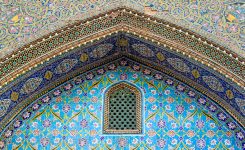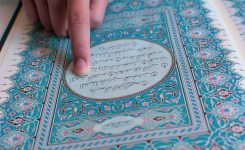Clarifying misconceptions
Is the narration of a woman throwing garbage upon the Prophet ﷺ true?
Question: What is the verdict of the noble scholars and righteous jurists on this matter; (1) during the lectures of the preachers and the khutba it is often said that one woman simply threw garbage on the Messenger of Allah (peace be upon him). One day she did not throw garbage, so the Messenger of Allah (peace be upon him) came into her house, cleaned the house, refilled the water, and so on and so forth.
So when the woman saw his good etiquettes and mannerisms, she became a Muslim. It is requested to investigate this narration. Is this narration in one of the hadith books or is it just folklore?
(2) can you also say whether a member of this Ummah is allowed to forgive an insulter [gustakh] of the Messenger (peace be upon him)? CLICK TO READ ANSWER
(2) can you also say whether a member of this Ummah is allowed to forgive an insulter [gustakh] of the Messenger (peace be upon him)? CLICK TO READ ANSWER
Questioner: [Mufti] Faqir Ziya Ahmad, Multan in Pakistan.
Answer:
The hadith mentioned in the question, after thoroughly searching, does not appear in any famous and reliable book of hadith and biography. Although one tradition is found in reliable books of hadith and biography, the implication of which is completely contrary to the said tradition. See as follows:
کنت بین شر جارین بین أبی لہب وعقبۃ بن أبی معیط، إن کان لیأتیان بالفروث فیطرحانہا علی بابی حتی إنہم لیأتون ببعض ما یطرحون من الأذی فیطرحونہ علی بابی
In some books this tradition is as follows with some extra words:
قال رسول اللہ صلی اللہ علیہ وسلم :کنت بین شر جارین بین أبی لہب وعقبۃ بن أبی معیط إن کانا لیأتیان بالفروث فیطرحانہا علی بابی حتی إنہم لیأتون ببعض ما یطرحون من الأذی فیطرحونہ علی بابی فیخرج بہ رسول اللہ صلی اللہ علیہ وسلم فیقول: یا بنی عبد مناف أی جوار ہذا؟ ثم یلقیہ بالطریق
[Kanz al-Ummal: 9/52 – al-Jami’ al-Saghir lil-Suyuti: 1/9260 – Jami’ al-Ahadith lil-Suyuti: 15/409 – al-Sirah al-Halabiyyah: 1/447 – al-Tabaqat al-Kubra li Ibn Sa’d: 1/157 – al-Tarikh al-Tabari: 2/343 – al-Kamil fi al-Tarikh: 1/685 – al-Bidaya al-Nihaya li Ibn al-Kathir: 3/122 – Sirah Ibn Hisham: 1/446]
The implications of both traditions are that the noble Prophet (peace be upon him) said, “I was living between two immoral neighbours, Abu Lahab and Uqba b. Abi Mu’ayt, who threw the dung from the animal intestines and sometimes harmful things (urine, blood, etc.) at my door.” The noble Prophet (peace be upon him) came out and said to both of them, “O children of the slave of Munaf!1 Who is such a neighbour?” Then he removed the dirt from the road.
First, Abu Lahab and Uqba b. Abi Mu’ayt were his nearby neighbours. There was only one wall difference. The noble Prophet (peace be upon him) told them that they were immoral neighbours because they laid out rubbish, garbage and so on.
Second, he admonished them both, saying, “Is this the right of the neighbour?”
The tradition in the question and this tradition is an open contradiction. The noble Prophet (peace be upon him) considered the old female neighbour who threw garbage, to be non-immoral and did not give any admonition, he rather went to her house and did her work. While he called Abu Lahab and Uqba as immoral neighbours and even admonished them. On the contrary, in a tradition from Sahih al-Bukhari, there is a supplication of detriment to Uqba b. Abi Mu’ayth and others.
قال: کان النبی صلی اللہ علیہ وسلم یصلی فی ظل الکعبۃ، فقال: “ابو جہل وناس من قریش ونحرت جزور بناحیۃ مکۃ، فارسلوا فجاء وا من سلاہا وطرحوہ علیہ فجاء ت فاطمۃ فالقتہ عنہ، فقال: اللہم علیک بقریش، اللہم علیک بقریش، اللہم علیک بقریش لابی جہل بن ہشام وعتبۃ بن ربیعۃ وشیبۃ بن ربیعۃ والولید بن عتبۃ وابی بن خلف وعقبۃ بن ابی معیط”، قال عبد اللہ: فلقد رایتہم فی قلیب بدر قتلی
[Sahih al-Bukhari: 4/44 – 2934 – باب الدعاء علی المشرکین بالہزیمۃ والزلزلۃ]
The Prophet (peace be upon him) was praying near the Ka’ba. Abu Jahl and some Quraysh would provoke. Someone [Uqba b. Abi Mu’ayt] brought the innards of a camel as he threw them on the noble Prophet (peace be upon him). Sayyida Fatima al-Zahra (Allah be pleased with her) removed it as she came. Then the noble Prophet (peace be upon him) supplicated detriment for Abu Jahl, ‘Utba, Shayba, Walid, Abi b. Khalf and Uqba b. Abi Mu’ayt. ‘Abdullah Ibn Abbas said, “I saw them killed in the Battle of Badr.”
And in another tradition in Sahih al-Bukhari it has the following added words,
قال رسول اللہ صلی اللہ علیہ وسلم : وأتبع أصحاب القلیب لعنۃ
[Sahih al-Bukhari: 1/110 – 520 – باب المرأة تطرح عن المصلی، شیئا من الأذى]
The noble Prophet (peace be upon him) said, “Curse be upon the people of the well.”2
Conclusion: Uqba b. Abi Mu’ayt was also his neighbour, but he threw filth and so forth, the noble Prophet (peace be upon him) supplicated for him and even his fellows for detriment. And he reminded Abu Lahab and Uqba of the rights of neighbours. So he called them immoral neighbours for throwing garbage in front of the house. But he said nothing to the woman who threw garbage. Instead, he went to her home for kindness and did her house chores just as some preachers made it famous. This is completely contrary to the intellect. The narrative of the woman who throws garbage compared to the narrations in Sahih al-Bukhari and in the books of hadith and biography is completely unapproved, unreliable and not worthy to be accepted.
Mufti Muhammad Zulfaqar Khan Naimi Kakralwi
13-Jumada al-Awwal-1440 || ≈ 19-Jan-2019
al-Fuyudat al-Nabawiyyah fi’l-Fatawa al-Hanafiyya (Fatawa Uttarakhand): vol. 2, p. 365, #122
Click for more fatawa’s of Mufti Zulfaqar Naimi
13-Jumada al-Awwal-1440 || ≈ 19-Jan-2019
al-Fuyudat al-Nabawiyyah fi’l-Fatawa al-Hanafiyya (Fatawa Uttarakhand): vol. 2, p. 365, #122
Click for more fatawa’s of Mufti Zulfaqar Naimi
- Name of their idol
- Because after the victory of the battle of Badr the Prophet (peace be upon him) told his companions (Allah be pleased with them) to bring 20 corpses of the Quraysh. The 20 corpses were dumped in the well as a sign of humiliation. In a narration, it said that they were brought back alive to feel the humiliation [Sahih al-Bukhari] – Added by translator
Total Page Visits: 12177 - Today Page Visits: 1



